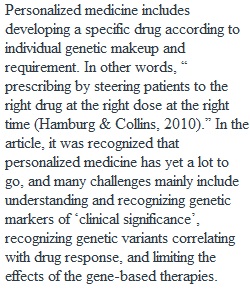


Q This Week's Posting Prompt: Your assignment is to read the three papers associated with this week's lab (they are also linked here), and pose a question for your classmates from one of them. OR you may answer a question posed by one of your classmates. • 2015 Schork - Time for one-person trialsLinks to an external site. • 2013 Davis - A case of personalized therapy for osteosarcoma Download 2013 Davis - A case of personalized therapy for osteosarcoma • 2010 Hamburg - The path to personalized medicineLinks to an external site. ________________________________________ General Guidance: You should read through this week's assigned lab and/or Peerceptiv material before you make your post, so that your post will be informed, and you avoid posing a question that is answered in the course materials. General Format: You are required to make ONE post to each week’s lab discussion board. Your required post must contain 50 words at minimum and be written in your own words. Your grade will be determined by your demonstration of three areas of communication: application, critical thinking, and writing. Deadline: Your required post is due by 11:59PM, Wednesday. Late posts will be penalized 0.5 points (20%) per day late. NOTE: We recommend that you avoid using the smartphone/tablet Canvas app when submitting your discussion post, because the app frequently fails to associate posts with your corresponding discussion group.
View Related Questions